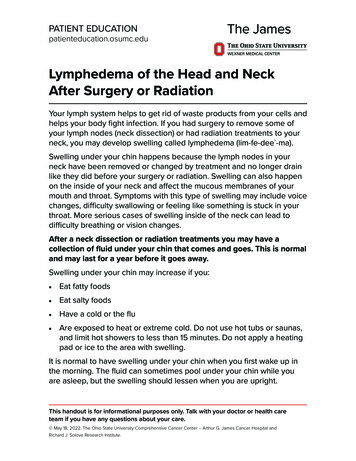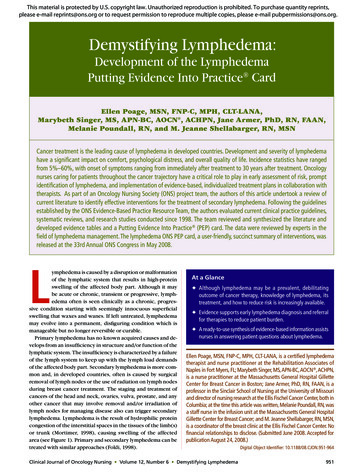
Transcription
PATIENT EDUCATIONpatienteducation.osumc.eduLymphedema of the Head and NeckAfter Surgery or RadiationYour lymph system helps to get rid of waste products from your cells andhelps your body fight infection. If you had surgery to remove some ofyour lymph nodes (neck dissection) or had radiation treatments to yourneck, you may develop swelling called lymphedema (lim-fe-dee -ma).Swelling under your chin happens because the lymph nodes in yourneck have been removed or changed by treatment and no longer drainlike they did before your surgery or radiation. Swelling can also happenon the inside of your neck and affect the mucous membranes of yourmouth and throat. Symptoms with this type of swelling may include voicechanges, difficulty swallowing or feeling like something is stuck in yourthroat. More serious cases of swelling inside of the neck can lead todifficulty breathing or vision changes.After a neck dissection or radiation treatments you may have acollection of fluid under your chin that comes and goes. This is normaland may last for a year before it goes away.Swelling under your chin may increase if you: Eat fatty foods Eat salty foods Have a cold or the flu Are exposed to heat or extreme cold. Do not use hot tubs or saunas,and limit hot showers to less than 15 minutes. Do not apply a heatingpad or ice to the area with swelling.It is normal to have swelling under your chin when you first wake up inthe morning. The fluid can sometimes pool under your chin while youare asleep, but the swelling should lessen when you are upright.This handout is for informational purposes only. Talk with your doctor or health careteam if you have any questions about your care. May 18, 2022. The Ohio State University Comprehensive Cancer Center – Arthur G. James Cancer Hospital andRichard J. Solove Research Institute.
What can I do to help drain fluid from areas with swelling?Here are a few things you can do to help move fluid from the areas ofyour head and neck that have swelling. These exercises should be doneeach day.Exercises1. Deep Diaphragmatic Breathing Take deep breaths so it feels as though you are filling yourstomach with air and release slowly. Repeat 3 to 5 times.2. Shoulder Rolls Roll your shoulders forward in a circle. Then, roll your shoulders backwardsin a circle. Relax and repeat 10 times.3. Head Tilts Gently move your right eartoward your right shoulder,hold for 5 seconds, andthen slowly bring yourhead back to the center.Repeat on the other side. Repeat 5 times to each side.4. Neck Flexion Bend your neck down and look at your toes. Hold for 5 seconds and repeat 10 times.Lymphedema of the Head and Neck After Surgery or Radiation
5. Neck Extension Bend your head backwards. Hold for 5 seconds and repeat 10 times.6. Shoulder Abduction Start with your arms down at your side. Lift your arms out to theside and up over your head. Repeat 10 times.7. Shoulder Blade Exercise With your arms bent at theelbows, push your shoulder bladestogether in back of you. Try not tolift your shoulders up. Repeat 10 times.Lymphedema of the Head and Neck After Surgery or Radiation
8. Chin Tuck Pull your chin back likeyou are trying to makea double chin. Hold for 5 seconds. Relax and repeat 10 times.9. Facial Exercises Do the movements listed below to make your face musclestighten. Do these exercises 5 to 7 times each day and hold eachexercise 5 to 7 seconds. Smile with teeth showing Smile with mouth closed Yawn Open and close your mouth without causing pain Squeeze your eyes closed Lift your eyebrowsCompression Place your hand on the swollen area and apply gentle pressure for5 to 10 seconds frequently throughout the day.If your physical therapist gives you a compression bandage orgarment, it is important to wear it every day for at least 4 hours in arow or to bed every night.Posture Keep your head and shoulders straight to help any fluid to drain. When sleeping, lay on your side without the swelling, if possible.Lymphedema of the Head and Neck After Surgery or Radiation
Skin Care Take good care of your skin and teeth to reduce your risk of gettingan infection.Use low pH lotion such as Eucerin.Use an electric razor when you shave to reduce nicks/cuts. Cleanyour razor daily. If you use a disposable razor, throw it away aftereach use.Lymphedema ClinicSpecial clinics to help with lymphedema are located at:The Stefanie Spielman Comprehensive Breast Center1145 Olentangy River RoadColumbus, OH 43212OSUCCC - James460 West 10th Avenue5th FloorColumbus, OH 43210The Cancer Support ClinicMartha Morehouse Medical Plaza Tower2050 Kenny Road6th FloorColumbus, OH 43221The Lymphedema Clinic locations offer the followingtreatments: Manual Lymphatic Drainage (MLD massage) NOTE: You should only do Manual Lymphatic Drainage massageif you have been instructed by a physical therapist. Skin care Specialized compression bandaging Measurement/fitting of compression garments Patient specific exercisesYou will need a doctor’s order for this service. To make an appointmentat the Lymphedema Clinic, call (614) 293-0043.Lymphedema of the Head and Neck After Surgery or Radiation
Lymphedema of the Head and Neck After Surgery or Radiation 5. Neck Extension Bend your head backwards. Hold for 5 seconds and repeat 10 times. 6. Shoulder Abduction Start with your arms down at your side. Lift your arms out to the side and up over your head. Repeat 10 times. 7. Shoulder Blade Exercise










![Drawing the Human Head Burne Hogarth[English] - Internet Archive](/img/29/drawing-the-human-head-burne-hogarth-english.jpg)